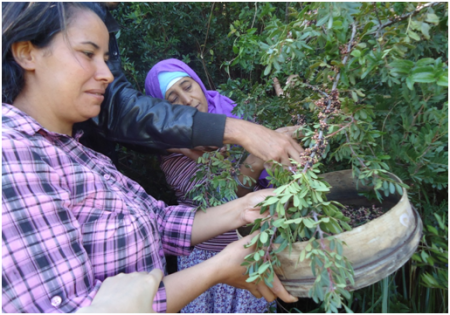
Objective:
This work aims the improvement of lentisk oil extraction in order to enable rural women to improve their working conditions and their incomes through the sale of this oil.
On the other hand, this work aims to make women aware of the importance of conserving the natural heritage of their region and, to encourage them to take positive ownership of their environment.
Context:
In Tunisia, Pistacia lentiscus fixed oil plays an important role as a medicinal product with high potential economic value in forest areas where this oil is extracted.
The traditional extraction methods, practiced by women, are based on non-ergonomic techniques giving a low yield. Mature fruits of lentisk are available for only 2-3 months in the year. The extracted oil is also characterized by a low quality affected by direct and repeated exposure to high temperature. All these conditions, added to the economic role of this oil, led us to look for a more appropriate and practical extraction method. In this context, researches were conducted to improve the traditional method by a new and reliable one.
Contacts:
Faten Mezni, faten-mez@hotmail.com, http://www.inrgref.agrinet.tn/
Sondes Fkiri, sondesfkiri@gmail.com, http://www.inrgref.agrinet.tn/
Boutheina Stiti, stitibou@gmail.com, http://www.inrgref.agrinet.tn/
Abdelhamid Khaldi, khalditn@yahoo.fr, http://www.inrgref.agrinet.tn/
Further information:
Mezghani S (1992). L’exploitation traditionnelle du maquis au nord de la Tunisie : possibilité d’une meilleure utilisation. Office de l’élevage et des pâturages. Tunis. pp. 99-158.